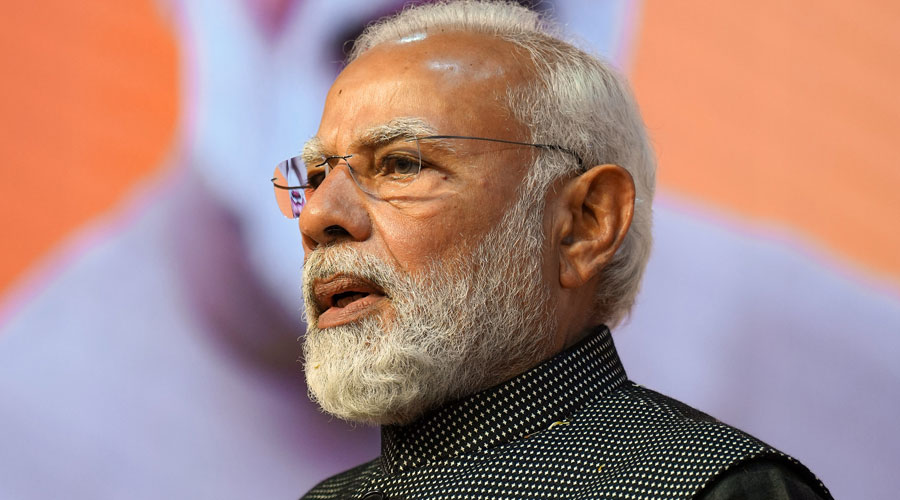Prime Minister Narendra Modi on Thursday inaugurated and laid foundation stones of development projects worth more than Rs 38,000 crore in different sectors in Mumbai, giving a big push to infrastructure, urban travel and healthcare ahead of civic polls, where the BJP and the Eknath Shinde-led Shiv Sena will seek to showcase these ventures to take on the political rivals.
This was Modi's first visit to Mumbai after Maharashtra Chief Minister Eknath Shinde took office in June-end last year after dislodging the Maha Vikas Aghadi (MVA) government.
At the inauguration and foundation stone laying ceremony of development projects at Bandra Kurla Complex (BKC), both Shinde and deputy chief minister Devendra Fadnavis targeted the Uddhav Thackeray-led Shiv Sena faction and the MVA government.
Civic elections in Mumbai and some other important cities, including Pune, Thane and Nagpur, are likely to be held later this year.
The Bharatiya Janata Party (BJP) and Shinde's faction of the Shiv Sena are looking to wrest control of the Brihanmumbai Municipal Corporation (BMC) from the Thackeray-headed camp.
At a function held at the MMRDA ground in BKC, Modi inaugurated and laid foundation stones of a string of projects worth more than Rs 38,000 crore aimed at developing infrastructure, easing urban travel, and strengthening healthcare in the financial capital.
He laid foundation stones for seven sewage treatment plants, a road concretisation project and redevelopment of the Chhatrapati Shivaji Maharaj Terminus.
The PM inaugurated Mumbai Metro Rail Lines 2A and 7 built at a cost of around Rs 12,600 crore. They comprise a 35km-long elevated corridor stretching from Andheri to Dahisar in suburban Mumbai.
Modi also inaugurated 20 'Aapla Davakhana' (health clinics) named after Shiv Sena founder Bal Thackeray.
Earlier in his speech, deputy chief minister Fadnavis said in the 2019 Assembly polls, Modi had urged people to vote for a 'double engine sarkar' (BJP in power in state and the Centre) in Maharashtra.
"But due to betrayal of some people, for two-and-a-half years (the tenure of MVA regime) we did not have a pro-people government in the state. But because of true followers of Balasaheb Thackeray, our government is back now," the BJP leader said, apparently referring to Shinde, who revolted against the Shiv Sena leadership in June 2022, leading to collapse of the Uddhav Thackeray-led government.
Modi is the only PM who inaugurated projects whose ground breaking ceremony he had performed, Fadnavis said, adding this reflects beginning of a new culture.
Those who ruled the Mumbai civic body for several years never worked to provide clean water to local residents, he said, targeting the Thackeray-led Sena faction.
Fadnavis also thanked the Centre for providing railway land for re-development of Dharavi, a sprawling slum colony in Mumbai.
Chief Minister Shinde said development took a backseat during the tenure of the MVA administration (November 2019-June 2022). ''We were able to free the people of Mumbai from suffocation under the MVA rule because of Modiji's leadership,'' said the CM.
Shinde went on to heap praise on the PM.
"There is something special about Modi's personality. I get a holy (pavitra) feeling," said the chief minister and added the Indian PM was a widely discussed political figure at the World Economic Forum (WEF) annual meeting in Davos.
Shinde was in Davos earlier this week.
The CM said his government will transform Mumbai in the next three years and give a new identity to India's financial capital and also Maharashtra. “Lets pledge to create a new Maharashtra under Modi's leadership,” he said.
The 18.6 km-long Mumbai Metro Rail line 2A connects suburban Dahisar (East) with the 16.5 km-long DN Nagar (yellow line) while the metro line 7 links Andheri (East) with Dahisar (East). The foundation stones of these lines were laid by PM Modi in 2015.
The prime minister also launched Mumbai 1 mobile app and National Common Mobility Card (NCMC).
The app, which can be shown at the entry gates of metro stations, will facilitate ease of travel. It supports digital payment to buy tickets through UPI.
The mobility card will initially be used in metro corridors and can be later extended to other modes of mass public transit, including suburban trains and buses, an official release said.
Commuters will not need to carry multiple cards or cash, it said, adding the NCMC will enable quick, contact-less digital transactions, easing the process with a seamless experience.
The seven sewage treatment plants will be built at a cost of around Rs 17,200 crore and come up at suburban Malad, Bhandup, Versova, Ghatkopar, Bandra, Dharavi and Worli. They will have a combined capacity of around 2,460 MLD, said the release.
In an effort to strengthen healthcare infrastructure in Mumbai, the prime minister inaugurated 20 Hinduhridaysamrat Balasaheb Thackeray Aapla Dawakhana' clinics. The initiative provides essential medical services like health check-ups, medicines, investigations and diagnostics, free to people.
The PM laid the foundation stone for three new hospitals- a 360-bed multi-speciality municipal hospital in Bhandup, a 306-bed facility in Goregaon (West), and a 152-bed maternity home in Oshiwara.
This will benefit lakhs of residents of the city and deliver top-class medical facilities to them, the release added.
The PM launched a road concretisation project worth Rs 6,100 crore for around 400 km of roads in the megapolis.
He also laid foundation stone for redevelopment of Chhatrapati Shivaji Maharaj Terminus in south Mumbai.
This project is aimed at decongesting the southern heritage node of the terminus, augmentation of facilities, better multi-modal integration and conserving and restoring the world-famous iconic structure to its past glory, the release said. The redevelopment will cost more than Rs 1,800 crore.
The prime minister also started the transfer of approved loans of more than one lakh beneficiaries under the PM SVANidhi Yojana.











